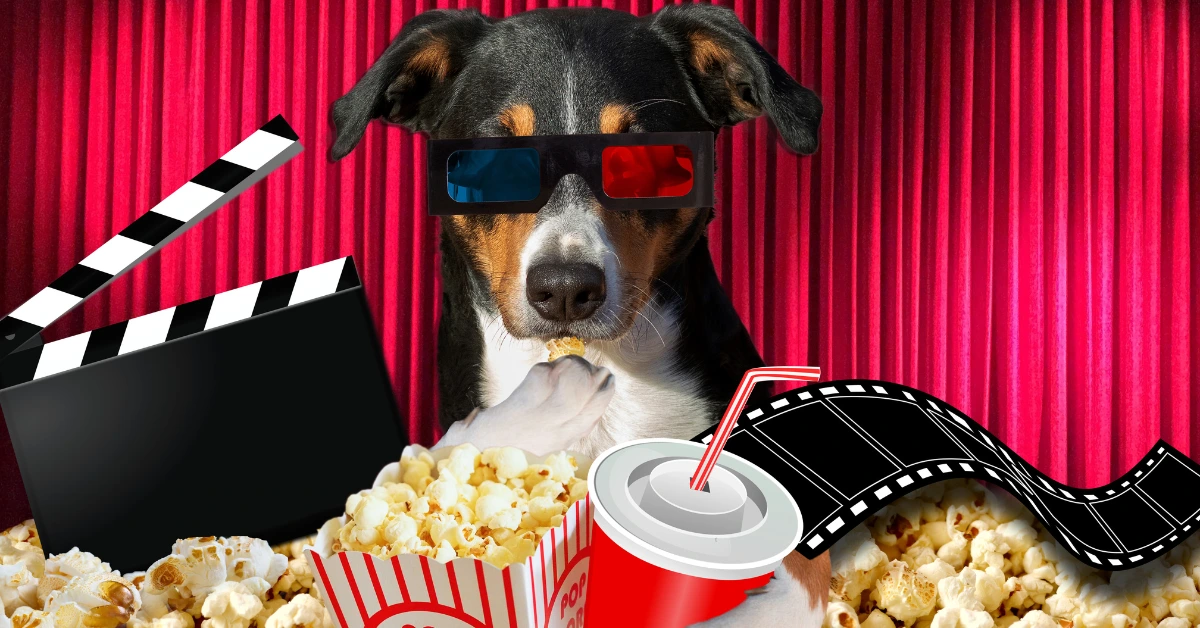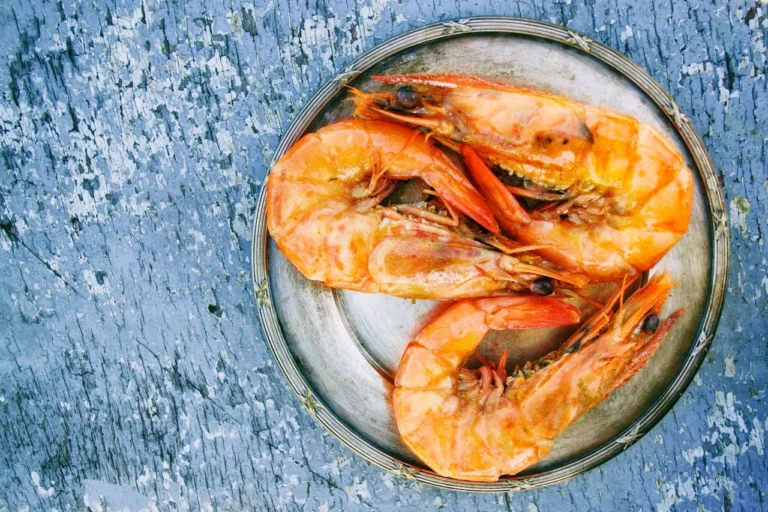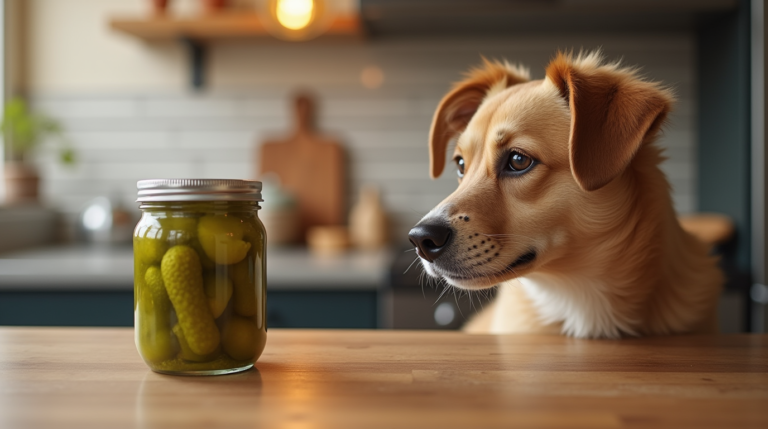Can Dogs Eat Popcorn? Find Out What’s Safe for Your Pup
Can dogs eat popcorn? You’re not the only one! Popcorn is safe for dogs, but you need to be careful. Make sure it doesn’t cause choking or stomach issues.
Plain air-popped popcorn is okay for dogs, but only in small amounts. It has good stuff like magnesium and zinc. But remember, treats should never make up more than 10% of your dog’s daily calories. This article will tell you which popcorns are safe and how much to give your dog.
Table of Contents
Understanding Popcorn and Your Dog’s Digestive System
Popcorn and dogs might seem like an unlikely pair, but knowing how they digest is crucial. Dogs digest carbs differently than humans, focusing more on protein and fats. Popcorn has fiber and minerals like magnesium and zinc, but these are found in good dog food too. Let’s explore what this means for your pet.
How Dogs Process Carbohydrates
Dogs can digest carbs, but they can’t fully break down complex corn. Their bodies focus more on protein and fats. So, carbs are best given in small amounts. Active dogs might handle a bit better than those who are less active.
Nutritional Profile of Popcorn
Plain popcorn has fiber and some vitamins like B6 and niacin, which help with digestion. But, these nutrients are also found in quality dog food. Choose plain kernels without salt, butter, or xylitol, which is harmful to dogs. A study on sled dogs showed that fiber-rich diets help with nutrient absorption, but popcorn shouldn’t replace their regular meals.
Comparing Canine and Human Digestion
Humans easily digest popcorn’s fiber, but dogs don’t have the same enzymes. Giving too much popcorn can upset their stomach or cause choking on kernels. Always check the labels—some microwave popcorn has toxic additives. Remember, your dog’s main nutrients should come from their regular food, not snacks.
- Key Takeaway: Popcorn’s fiber can help dogs in small amounts, but it’s not essential.
- Watch for signs of allergies like vomiting or itching.
- Keep treats to 10% of their daily calories to prevent weight gain.
Can Dogs Eat Popcorn Safely?
Yes, dogs can eat popcorn, but only under certain conditions. It must be plain, air-popped, and given in small amounts. It should not make up more than 10% of their daily calories. For instance, a small dog can safely have up to 1 cup of air-popped popcorn.
- Remove all butter, salt, and toppings—these additives increase sodium and fat content, risking dehydration or pancreatitis.
- Check for unpopped kernels. Hard kernels can cause choking or intestinal blockages, specially in small breeds like Chihuahuas.
- Never microwave popcorn in bags lined with PFCs (perfluorinated chemicals), which are linked to health risks.
| Dog Size | Portion Size |
|---|---|
| Extra-small (2–20 lbs) | 1–2 popped pieces |
| Small (21–30 lbs) | 2–3 pieces |
| Medium (31–50 lbs) | 5–6 pieces |
| Large (51–90 lbs) | Small handful |
| Extra-large (91+ lbs) | 1 handful |
Choose safe options like BIXBI Liberty Ruff Puffs or PupCorn Plus. These are made to be safe for dogs. Always watch your dog while they eat. If they eat an unpopped kernel or seem upset, call a vet right away.
The Potential Benefits of Plain Popcorn for Dogs
Plain, air-popped popcorn isn’t a must-have for dogs. But, it can be a small treat with some benefits. Always remember, your dog’s main meals are key. Always check with your vet before adding new snacks.
Fiber Content and Digestive Health
Fiber in plain popcorn can help with digestion. It helps food move through the digestive system. This can lower the risk of constipation.
But, your dog should get most of their fiber from their regular dog food. Relying too much on popcorn fiber is not good.
Low-Calorie Treat Options
Plain popcorn is a dog-friendly snack because it’s low in calories. A single cup of air-popped kernels has about 30 calories. This is much less than many other treats.
This makes it a good choice for dogs watching their weight. Just remember to keep the portions small. This way, you stay within the 10% treat-calorie rule.
Minerals and Nutrients in Plain Popcorn
Plain popcorn has trace minerals like magnesium, phosphorus, zinc, and B vitamins. These help with nerve function, energy, and immune health. But, these nutrients are in small amounts.
Don’t treat popcorn as a main source of nutrition. Its role is to add a little extra, not to replace regular meals.
Dangerous Popcorn Ingredients to Avoid
When asking is popcorn bad for dogs, the answer depends on what’s added. While plain, air-popped kernels are safe in moderation, most toppings pose serious risks of dogs eating popcorn. Here’s what to avoid:
- Butter or oils: High-fat toppings can trigger pancreatitis, a serious issue, in breeds like Labradors.
- Salt: Too much sodium can cause salt poisoning, leading to vomiting, diarrhea, or seizures.
- Artificial sweeteners: Avoid popcorn with xylitol, a sugar substitute that can cause liver failure in dogs.
- Cheese or caramel coatings: Dairy and added sugars can upset stomachs, while sticky toppings risk intestinal blockages.
Unpopped kernels are also a hazard. Small dogs like Chihuahuas or Shih Tzus face choking risks. Swallowed kernels may block intestines. Always check bags for hidden additives like garlic powder or onion powder, which are toxic to canines. Even “natural” flavorings might contain unsafe spices.
Commercial popcorn varieties like microwave or theater popcorn are off-limits. They often contain artificial preservatives and excessive salt. Always read labels—even if you’re sharing a few kernels as a treat.
How Different Popcorn Varieties Affect Your Dog
Choosing the right popcorn is crucial for your dog’s safety. Each type has its own risks. Let’s explore the most common ones to keep your pet safe.
Microwave Popcorn Risks
- Chemical coatings in microwave bags may contain PFOA, linked to health issues.
- Artificial butter flavoring (diacetyl) can irritate a dog’s respiratory system.
- Excessive salt increases dehydration and sodium toxicity risks.
Movie Theater Popcorn Dangers
Theater popcorn is a no-go for dogs. Its heavy butter and salt coating can:
- Trigger stomach upset from high fat content.
- Lead to dehydration due to salt overload.
Caramel and Flavored Popcorn Concerns
Flavored varieties pose hidden threats:
- Sugary toppings like caramel promote obesity and dental decay.
- Xylitol (in some sweetened brands) is toxic to dogs.
- Chocolate-flavored options risk severe poisoning.
Can Dogs Eat Skinny Pop Popcorn?
Plain Skinny Pop (unsalted and unflavored) can be an occasional treat. But:
- Stick to small portions (1-2 popped cups max).
- Check labels for added oils, salt, or sugar.
| Type | Safety | Risks |
|---|---|---|
| Air-Popped | Low Risk | Unpopped kernels, choking hazard |
| Microwave | High Risk | Chemicals, artificial additives |
| Theater | High Risk | Excessive salt, butter |
| Skinny Pop (plain) | Moderate Risk | Only in tiny amounts |
Always prioritize your dog’s health by avoiding flavored varieties and checking ingredients. When in doubt, consult your vet before sharing any popcorn.
Signs Your Dog Has Eaten Too Much Popcorn
If your dog seems upset after eating popcorn, you need to act quickly. Popcorn can be toxic to dogs if they eat too much or the wrong kind. The danger depends on the type and amount they eat. Here are some signs to watch for:
Immediate Symptoms to Watch For
- Vomiting or diarrhea within 24 hours
- Lethargy or refusing to eat
- Stomach swelling or whining when touched
- Difficulty moving or walking
Potential Long-term Risks
Eating popcorn regularly, even in small amounts, can cause problems. This includes:
- Obesity from too many calories
- Pancreatitis from high-fat toppings
- Teeth damage from sticky caramel or hard kernels
- Electrolyte imbalances from too much salt
When to Seek Veterinary Care
If your dog shows these signs, call a vet right away:
- Vomiting blood or black stools
- Weakness or collapsing
- Swelling of the face or limbs
- Labored breathing or rapid heartbeat
| Dog Size | Maximum Safe Serving |
|---|---|
| Toy breeds (under 10 lbs) | 1–2 pieces |
| Small–medium breeds (10–30 lbs) | 3–4 pieces |
| Large–giant breeds (over 70 lbs) | 6–8 pieces |
Always watch your dog after giving them treats. Unpopped kernels can block their intestines. So, check for any choking hazards. If you’re unsure, it’s best to talk to your vet.
Serving Popcorn to Your Dog: Best Practices
If you want to share popcorn with your dog, make sure it’s safe for dogs to eat popcorn. Only give them plain, air-popped kernels without butter, oil, or salt. Use a stove or air popper to avoid harmful additives. Always remove unpopped kernels, which can damage teeth or cause choking.
- Portion Size: Offer no more than 5-10 popped kernels for small dogs, 10-15 for medium, and 15-20 for large breeds. One cup of air-popped popcorn has just 30 calories, but it should never exceed 10% of your dog’s daily calories.
- Cool completely before serving to prevent burns. Monitor your dog while they eat to watch for choking or digestive discomfort.
- Avoid flavored varieties—caramel, buttered, or sweetened popcorn contains sugars and additives harmful to dogs. Chocolate or salted options are specially dangerous.
Popcorn for dogs should be an occasional treat. Over 56% of U.S. dogs are overweight, so extra calories from popcorn can lead to obesity. Always check with your vet before introducing new foods, as about 10% of dogs react to corn products.
Remember: Popcorn offers minimal nutrition and no essential vitamins for dogs. Prioritize vet-approved treats or high-quality dog food for their dietary needs. When in doubt, stick to plain, air-popped kernels as a rare indulgence.
Healthier Alternatives to Popcorn for Dogs
Looking for dog-friendly snacks? There are safer, nutritious options that avoid popcorn’s dangers. Many healthy snacks for dogs are better for their health and safety. Here’s how to pick the right ones:
Vegetables That Make Great Dog Snacks
Vegetables are full of fiber and vitamins, unlike popcorn. They’re also lower in calories. Here are some good choices:
- Carrots: Crunchy and packed with beta-carotene.
- Green beans: Low in calories, high in fiber.
- Cucumber slices: Refreshing and free of sodium.
- Sweet potato: Baked or steamed for vitamins and antioxidants.
Commercial Dog Treats vs. Human Foods
“55.8% of dogs are overweight, making smart snacking critical for pet health.” – American Pet Products Association
| Category | Commercial Dog Treats | Human Foods |
|---|---|---|
| Pros | Fortified with vitamins, vet-approved ingredients | Natural, cost-effective |
| Cons | May contain fillers | Risks of choking/toxic ingredients |
| Best Options | Wellness Soft & Baker’s | Steamed veggies, plain yogurt (in moderation) |
Homemade Dog-Friendly Snack Recipes
Here’s a simple recipe for a low-calorie treat:
- Mix 1/2 cup rolled oats, 1 mashed banana, and 1 egg.
- Shape into small patties and bake at 350°F for 20 minutes.
- Cool completely before serving as training treats.
Always remove seeds, pits, and tough skins. Watch for allergic reactions, mainly when trying new foods.
Addressing Common Myths About Dogs and Popcorn
Sorting fact from fiction is key to keeping your dog safe. Let’s clear up myths that could harm your pet.
- Myth: Dogs can eat anything humans do in moderation.
Reality: While popcorn and dogs can be together, their bodies are different. Even a little salt or butter in popcorn can upset their stomachs or cause long-term problems. - Myth: Popcorn is a healthy dog treat.
Reality: Plain popcorn has fiber and carbs, but it’s not enough for a dog’s diet. Too much can lead to obesity or stomach problems. - Myth: Butter or salt in moderation won’t harm dogs.
Reality: Butters and salts are bad for dogs. Too much salt can raise blood pressure, and fats can cause pancreatitis. - Myth: Corn allergies in dogs are rare.
Reality: Corn is a common allergen for dogs. Signs like itching, vomiting, or diarrhea mean they can’t tolerate it. Always watch how they react.
When giving sweetcorn as a treat, remember to keep portions small to avoid overfeeding:
| Dog Size | Serving Size |
|---|---|
| Small dogs (up to 20 lbs) | 1-2 tablespoons |
| Medium dogs (20-50 lbs) | 2-4 tablespoons |
| Large dogs (50-90 lbs) | 1/4 to 1/2 cup |
| Giant dogs (90+ lbs) | 1/2 to 1 cup |
Sweetcorn has vitamins B6, C, and antioxidants, but there are risks if dogs eat popcorn. Make sure to remove kernels and only give plain, unseasoned varieties. If unsure, always check with your vet before introducing new foods.
Puppy-Specific Concerns: Is Popcorn Bad for Puppies?
Puppies need extra care because of their small size. The question can dogs eat popcorn is common, but puppies face special risks. Unpopped kernels can block their digestive system or harm their teeth, according to vets.
Puppies under six months should not eat popcorn at all.
Developmental Considerations for Young Dogs
Young puppies have digestive systems that are still growing. They can’t handle the fiber in popcorn well, which can upset their stomachs. There’s also a risk of sodium poisoning if they eat salted popcorn.
Their small airways make it dangerous for them to inhale popcorn kernels.
Introducing New Foods to Puppies
Always introduce new foods slowly to puppies. Start with just 1-2 popped kernels. Watch for signs of upset stomach for 12-24 hours.
Make sure to avoid adding seasonings. Puppies need simple, nutritious foods during their growth phase.
Age-Appropriate Treats for Growing Dogs
Choose safe treats for puppies like:
- Steamed green beans (low-calorie)
- Blueberries (washed and quartered)
- Cooked chicken (no bones)
| Aspect | Puppies ( | Adult Dogs |
|---|---|---|
| Choking Risk | High | Moderate |
| Digestive Sensitivity | Very High | Moderate |
| Recommended Serving Size | 0% (avoid) | ≤10% of daily calories |
Always talk to your vet before giving your puppy snacks. Puppies do best on special puppy diets, not human food. Choose treats that are right for their growth stage to help them stay healthy.
Conclusion: Making the Right Snack Choices for Your Dog
When thinking about popcorn for dogs, choose plain, air-popped kernels as an occasional treat. Always remove unpopped kernels to avoid choking hazards. Also, check for hidden additives like salt, butter, or xylitol, which are dangerous.
Healthy snacks for dogs should focus on balanced nutrition, not human foods with risks. A small piece of plain popcorn might not harm most adult dogs. But it offers minimal nutritional value compared to dedicated dog treats.
Stick to the 10% treat rule—popcorn should never make up more than 10% of your dog’s daily calories. Opt instead for vet-approved options like carrots, apples, or commercial dog snacks designed for their dietary needs. Always inspect popcorn for seasonings like garlic powder or onion powder, which are toxic even in small amounts.
Unpopped kernels can crack teeth or lodge in throats, so only offer fully popped, unsalted pieces. While occasional popcorn isn’t inherently harmful, healthier snacks for dogs exist that provide fiber and nutrients without risks.
Consult your vet before introducing new foods, specially for puppies or dogs with dietary restrictions. Prioritize safety over convenience—your dog’s health depends on choices made with knowledge, not assumption.
FAQ
Is popcorn bad for dogs?
Plain, air-popped popcorn isn’t toxic to dogs. But, make sure there are no additives. Also, watch the portion sizes to avoid choking hazards.
Can dogs eat popcorn safely?
Dogs can have small amounts of plain popcorn. But, it should only be an occasional treat, not a regular part of their diet.
What are the risks of dogs eating popcorn?
Risks include choking on kernels and gaining weight from too many calories. Also, harmful additives like butter and salt can upset their stomachs.
Can dogs eat Skinny Pop popcorn?
Dogs can have a little Skinny Pop popcorn. But, always check the ingredients for harmful additives. Remember, it’s only for occasional treats.
What should I do if my dog eats too much popcorn?
Look for signs like vomiting or diarrhea right away. If your dog seems distressed, call your vet for advice.
Are there healthier snacks for dogs beside popcorn?
Yes! Try dog-friendly veggies like carrots and green beans. Or, use special dog treats or homemade snacks for a healthier option.
Is popcorn bad for puppies?
It’s best to avoid popcorn for puppies. Their digestive systems are sensitive, and there’s a higher risk of choking. Stick to puppy-safe treats instead.
What are some common misconceptions about dogs and popcorn?
Some myths say dogs can eat human foods in moderation. But, many foods are harmful to dogs. Popcorn shouldn’t be a regular treat for them.


